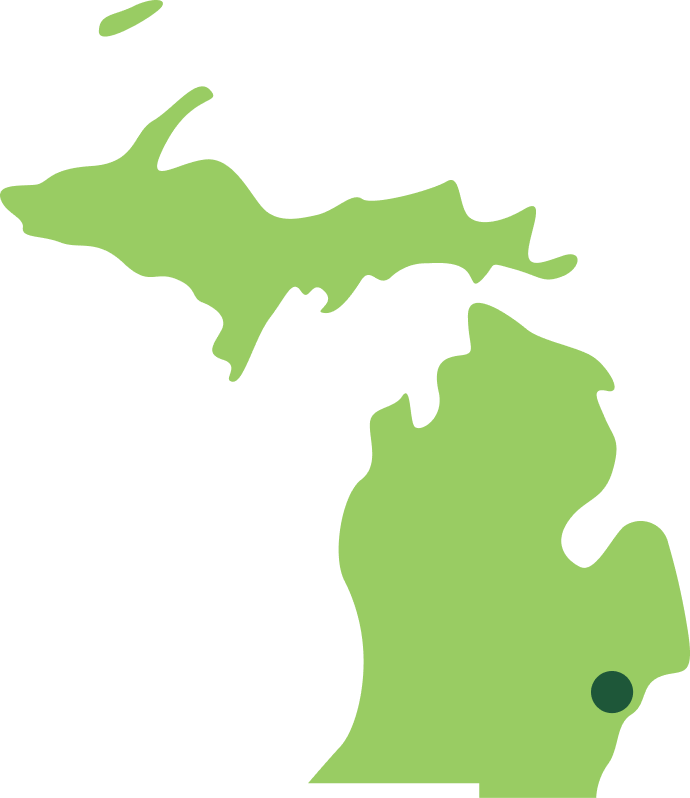Scaling solutions that work through capacity and innovation awards
Highlight
Scaling solutions that work through capacity and innovation awards
Nationwide
When Fair Food Network launched a special fund on behalf of the Nutrition Incentive Hub to help deepen the impact of nutrition incentive programs at the height of the pandemic, it was a creative way to “meet the moment” during an unprecedented crisis. What the fund emphasized is that, for families struggling to put healthy food on the table, and for farmers, food retailers, and fledgling nutrition incentive programs coalescing to form a more resilient local food system, the moment is always now.
In the ensuing years, the Capacity Building and Innovation Fund has grown as a vital resource for nutrition incentive and produce prescription programs tackling challenges, dismantling barriers to program usage, and enhancing the nutrition incentive user experience. In the latest round of funding in December, the Hub awarded more than $1.2 million to 39 organizations to increase local food system resilience across 19 states, Guam, Puerto Rico, The US Virgin Islands, and Washington, DC.
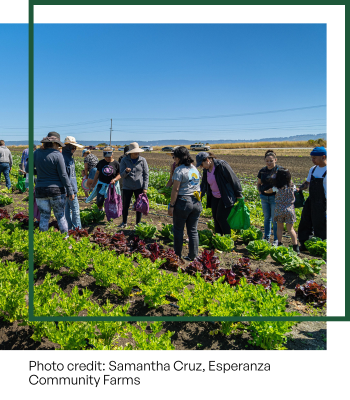 The Hub’s capacity building awards are one way that Fair Food Network is supporting partners who are scaling innovations that contend with nutrition insecurity. As program partners demonstrate the value of these innovations, they are shared with others in the field. “One of the reasons we started the program during the pandemic is because so many federally funded programs were experiencing the same challenges like how to pay for PPE or pivot operations to meet COVID protocols,” says Fair Food Network’s Senior Director of Nutrition Incentives, Erica Christensen Raml. “Since then, the focus of the fund has evolved to continue meeting the changing times. We have found that certain barriers to program usage — like transportation issues or language access — are common program-wide.”
The Hub’s capacity building awards are one way that Fair Food Network is supporting partners who are scaling innovations that contend with nutrition insecurity. As program partners demonstrate the value of these innovations, they are shared with others in the field. “One of the reasons we started the program during the pandemic is because so many federally funded programs were experiencing the same challenges like how to pay for PPE or pivot operations to meet COVID protocols,” says Fair Food Network’s Senior Director of Nutrition Incentives, Erica Christensen Raml. “Since then, the focus of the fund has evolved to continue meeting the changing times. We have found that certain barriers to program usage — like transportation issues or language access — are common program-wide.”
In 2024, for example, the Hub provided an award to Mid-America Regional Council in Kansas City, MO to address language and transportation barriers to patients eligible but unable to access the local produce prescription program, KC Fresh Rx. With CBIF funds, the Regional Council is now able to provide KC Fresh Rx materials in three additional languages in high demand. Transportation will also be provided to nutrition education classes and grocery stores where participants can purchase fruits and vegetables with their KC Fresh Rx cards. Similarly, Montefiore, a teaching hospital in New York City, is leveraging its 2024 CBIF grant to make transportation to and from its produce prescription pickup point at the Bronx Health Collective available to all participants in the local produce prescription program, FreshTakes.
While these programs are encouraged to share their challenges, successes, and strategies for remaining resilient, each community has its own unique histories and food systems. “What makes these capacity building grants so impactful is how adaptable this funding is to localized needs,” says Raml. “With the CBIF and technical assistance provided by the Hub, we’ve created a powerful mechanism to help communities create more resilient local food and agriculture systems.”
Take the CBIF grant to the Northeast Organic Farming Association of Vermont (NOFA-VT). NOFA-VT and Good Shepherd Food Bank have been working to expand equitable access to two regional SNAP incentive programs serving the Northeast. Responding to calls from multilingual community members, farmers market managers, and direct service providers who work with immigrant, refugee, and New American communities, NOFA-VT and Good Shepherd have translated the Crop Cash and Farm Fresh Reward webpages and outreach materials into multiple languages, coordinated with partner organizations to inform their communities about the two programs, and conducted in-person outreach events with interpreters. The Hub’s capacity building funds will build on this foundation, focusing efforts on feedback from community partners and program participants to advance program accessibility and enroll more community members in the programs.
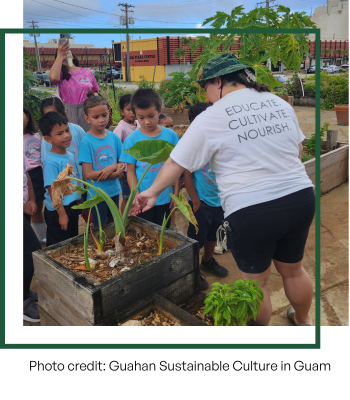 Together with our partners, Fair Food Network is supporting growing demand and helping nascent programs -— from Esperanza Community Farms in Watsonville, CA, to Knowledge Quest in Memphis, to Guahan Sustainable Culture in Guam — to explore innovative methods for service delivery and build organizational capacity to apply for and implement the large federal awards that make the impacts of nutrition incentive and produce prescription projects possible. And while each community’s program has the freedom to adapt to local needs, all — whether new or already established — are finding innovative ways to provide healthy food options for families who need it most, increase sales and expand the customer base for participating businesses, and produce more income for local farmers. “Capacity building grants give us a chance to provide additional support to communities that are innovating in scalable ways and can serve as models of resilience for the nutrition incentive field,” says Raml. “And they’re also a way to fund some really great ideas.”
Together with our partners, Fair Food Network is supporting growing demand and helping nascent programs -— from Esperanza Community Farms in Watsonville, CA, to Knowledge Quest in Memphis, to Guahan Sustainable Culture in Guam — to explore innovative methods for service delivery and build organizational capacity to apply for and implement the large federal awards that make the impacts of nutrition incentive and produce prescription projects possible. And while each community’s program has the freedom to adapt to local needs, all — whether new or already established — are finding innovative ways to provide healthy food options for families who need it most, increase sales and expand the customer base for participating businesses, and produce more income for local farmers. “Capacity building grants give us a chance to provide additional support to communities that are innovating in scalable ways and can serve as models of resilience for the nutrition incentive field,” says Raml. “And they’re also a way to fund some really great ideas.”

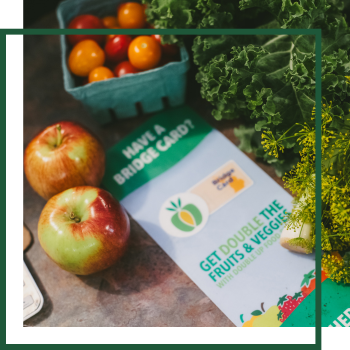 Double Up Food Bucks
Double Up Food Bucks Fair Food Network’s own Double Up Michigan team aims to help families bring home healthy fruits and vegetables while supporting Michigan farmers, in this case by working with grocers and food distribution networks to create more connections between what’s being grown locally and what’s available on store shelves. “Independent stores want to offer more fresh, local options, but they often don’t have the infrastructure, sourcing connections, or volume needed to access Michigan-grown produce consistently,” says Charles Walker, retail specialist. “They need support to bridge that gap—so they can be part of the solution in bringing healthy food closer to home.” Double Up Michigan aims to ensure the nearly 30 food retail locations in the city buy 20% or more locally grown produce during peak growing season in Michigan as a key requirement of being a part of the program. This helps build the market for Michigan farmers by driving demand for locally grown fruits and vegetables as part of the program model. Double Up Food Bucks in Michigan not only helps people using SNAP benefits but also supports farmer viability and keeps dollars circulating in local economies.
Fair Food Network’s own Double Up Michigan team aims to help families bring home healthy fruits and vegetables while supporting Michigan farmers, in this case by working with grocers and food distribution networks to create more connections between what’s being grown locally and what’s available on store shelves. “Independent stores want to offer more fresh, local options, but they often don’t have the infrastructure, sourcing connections, or volume needed to access Michigan-grown produce consistently,” says Charles Walker, retail specialist. “They need support to bridge that gap—so they can be part of the solution in bringing healthy food closer to home.” Double Up Michigan aims to ensure the nearly 30 food retail locations in the city buy 20% or more locally grown produce during peak growing season in Michigan as a key requirement of being a part of the program. This helps build the market for Michigan farmers by driving demand for locally grown fruits and vegetables as part of the program model. Double Up Food Bucks in Michigan not only helps people using SNAP benefits but also supports farmer viability and keeps dollars circulating in local economies.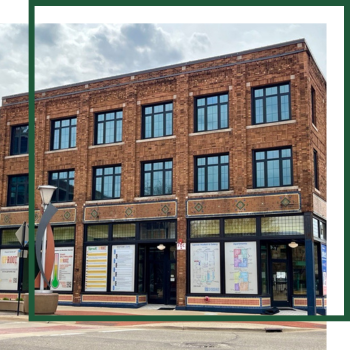 This
This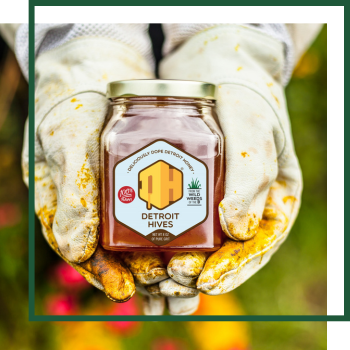 While Danu Hof Family Farm is expanding its operations to meet growing demand, other awardees, such as
While Danu Hof Family Farm is expanding its operations to meet growing demand, other awardees, such as 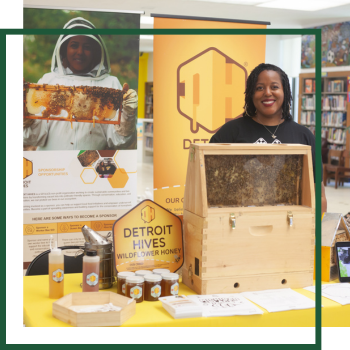 to improve underserved communities for both people and pollinators by transforming blighted vacant lots into
to improve underserved communities for both people and pollinators by transforming blighted vacant lots into

